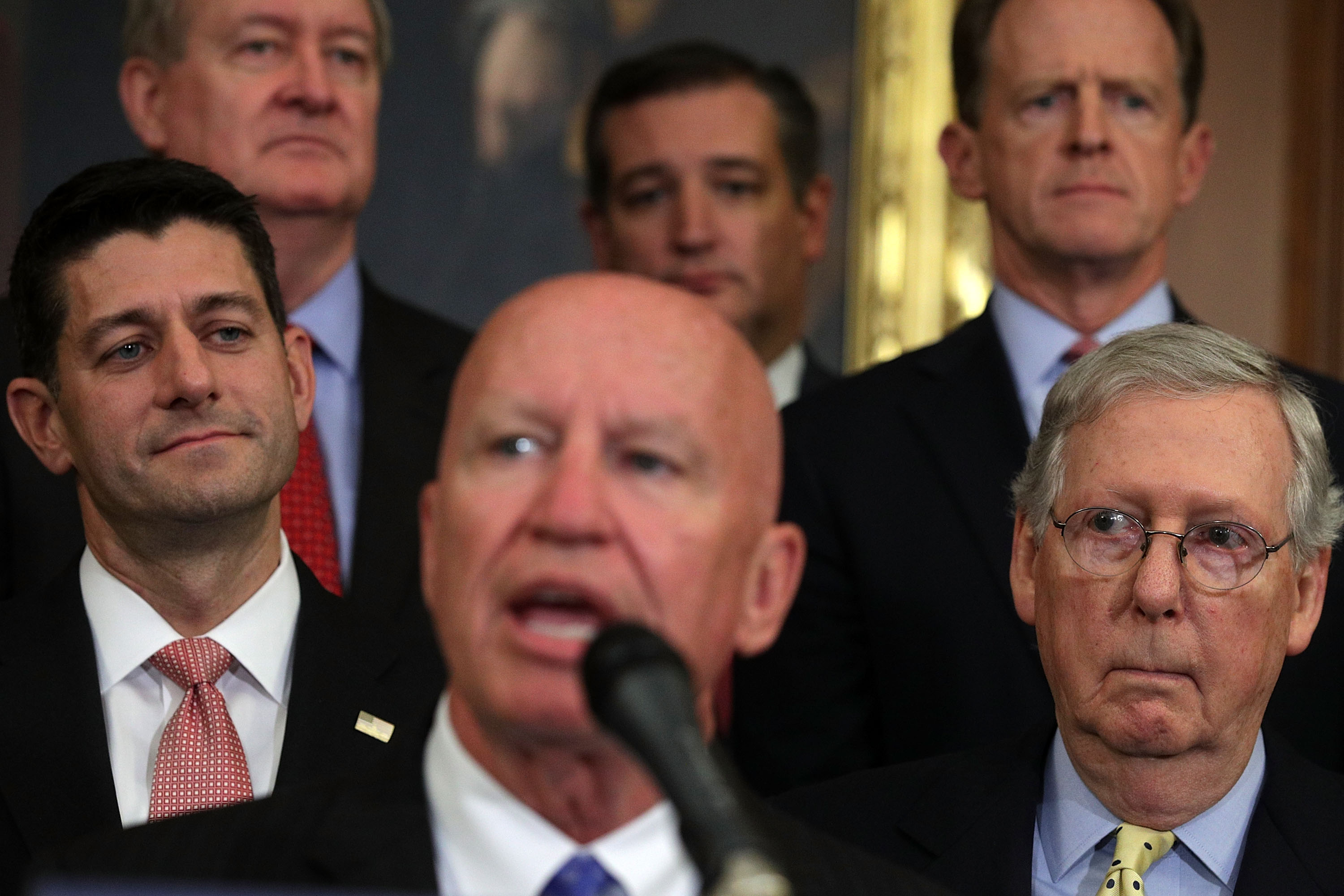The lunacy of Republicans' post-bloodbath focus on tax cuts
If Republicans think tax cuts will save them from another shellacking, they're out of their minds


In their postmortems of a brutal election night, Republican elected officials, strategists, and pundits all seemed to agree on one thing: The party really, really needs to pass the tax-cut bill now. It needs to "put a W on the board." It needs to deliver something meaningful to President Trump's desk.
Even before Tuesday's rout, the GOP tax cut effort was the "glue holding a fractured Republican Party together," according to a New York Times analysis: "The prospect of a once-in-a-generation bill to cut taxes on businesses and individuals increasingly appears to be the best hope for a party anxious to find common ground and advance an effort that it has long championed as the pinnacle of Republican orthodoxy. It is a bit like having a baby to save a failing marriage."
That's a clever simile. There's truth to it. But it's misleading to look at tax cuts as the "pinnacle of Republican orthodoxy." Rather than a hierarchy of priorities with tax cuts at its highest point, consider the GOP agenda as a retail establishment instead. At the front of the store are the loss leaders — the items they discount, the stuff they don't care about taking a hit on — in order to lure you into buying the highly profitable stuff they really want to sell.
The Week
Escape your echo chamber. Get the facts behind the news, plus analysis from multiple perspectives.

Sign up for The Week's Free Newsletters
From our morning news briefing to a weekly Good News Newsletter, get the best of The Week delivered directly to your inbox.
From our morning news briefing to a weekly Good News Newsletter, get the best of The Week delivered directly to your inbox.
Consider the ill-fated Ed Gillespie campaign for governor in Virginia. In its final push, the campaign downplayed its policy agenda, including a proposal for an across-the-board tax cut that had been the "centerpiece" of the campaign in March, and began highlighting culturally incendiary issues like MS-13 gangs, sanctuary cities, and Confederate statues. It's highly unlikely that the establishment stalwart Gillespie truly cared about these issues; in effect, they were his loss leaders. The centerpiece — the big payoff — was the tax cuts.
It didn't work for Gillespie, and that should deeply worry national Republicans, at least when it comes to selling a tax-cut proposal that heavily favors the top 1 percent of earners.
Man doesn't live by bread alone — and Republicans can't live by tax cuts alone. Today's hyperfocus on upper-bracket tax cuts is a doctrinal triumph of the supply-side wing of the conservative movement, which has dined for years on self-serving myths about JFK and Ronald Reagan. But there's scant evidence in history to support the predominance of tax-cutting as a panacea for either the economy or GOP electoral success.
Nixon won on restoring law and order and winding down the war in Vietnam; Reagan, stagflation and the Desert One fiasco; Bush 41, on continuing Reagan's legacy and promising not to raise taxes; Bush 43, on Clinton fatigue and "restoring dignity to the White House" and, the second time, on terrorism; the Obama-era congressional routs, on Obamacare and its shaky implementation; and Trump … well, let's agree Trump didn't win key Rust Belt voters because of a promise to cut income tax rates for corporations and affluent individuals.
A free daily email with the biggest news stories of the day – and the best features from TheWeek.com
There's a case to be made that narrowly-tailored tax cuts for middle-class families who are having difficulty keeping up with living expenses would be a political winner for Trump and congressional Republicans. But that's not what they're proposing (even if that's the way they will attempt to sell it). As word gets out that the GOP tax-cut plan is heavily tilted toward the wealthy and disadvantages the very kind of suburban voters among whom they just got shellacked, its magical powers of uniting the party are going to evaporate.
Republicans are counting on the tax-cut issue to bear too much weight. Tax cuts are supposed to be the reward — not the lure — for winning elections. And they're about to find out that they probably can't save the party from losing the next one.
Scott Galupo is a freelance writer living in Virginia. In addition to The Week, he blogs for U.S. News and reviews live music for The Washington Post. He was formerly a senior contributor to the American Conservative and staff writer for The Washington Times. He was also an aide to Rep. John Boehner. He lives with his wife and two children and writes about politics to support his guitar habit.
-
 Alaa Abd el-Fattah: should Egyptian dissident be stripped of UK citizenship?
Alaa Abd el-Fattah: should Egyptian dissident be stripped of UK citizenship?Today's Big Question Resurfaced social media posts appear to show the democracy activist calling for the killing of Zionists and police
-
 Biggest political break-ups and make-ups of 2025
Biggest political break-ups and make-ups of 2025The Explainer From Trump and Musk to the UK and the EU, Christmas wouldn’t be Christmas without a round-up of the year’s relationship drama
-
 Why 2025 was a pivotal year for AI
Why 2025 was a pivotal year for AITalking Point The ‘hype’ and ‘hopes’ around artificial intelligence are ‘like nothing the world has seen before’
-
 Bari Weiss’ ‘60 Minutes’ scandal is about more than one report
Bari Weiss’ ‘60 Minutes’ scandal is about more than one reportIN THE SPOTLIGHT By blocking an approved segment on a controversial prison holding US deportees in El Salvador, the editor-in-chief of CBS News has become the main story
-
 Has Zohran Mamdani shown the Democrats how to win again?
Has Zohran Mamdani shown the Democrats how to win again?Today’s Big Question New York City mayoral election touted as victory for left-wing populists but moderate centrist wins elsewhere present more complex path for Democratic Party
-
 Millions turn out for anti-Trump ‘No Kings’ rallies
Millions turn out for anti-Trump ‘No Kings’ ralliesSpeed Read An estimated 7 million people participated, 2 million more than at the first ‘No Kings’ protest in June
-
 Ghislaine Maxwell: angling for a Trump pardon
Ghislaine Maxwell: angling for a Trump pardonTalking Point Convicted sex trafficker's testimony could shed new light on president's links to Jeffrey Epstein
-
 The last words and final moments of 40 presidents
The last words and final moments of 40 presidentsThe Explainer Some are eloquent quotes worthy of the holders of the highest office in the nation, and others... aren't
-
 The JFK files: the truth at last?
The JFK files: the truth at last?In The Spotlight More than 64,000 previously classified documents relating the 1963 assassination of John F. Kennedy have been released by the Trump administration
-
 'Seriously, not literally': how should the world take Donald Trump?
'Seriously, not literally': how should the world take Donald Trump?Today's big question White House rhetoric and reality look likely to become increasingly blurred
-
 Will Trump's 'madman' strategy pay off?
Will Trump's 'madman' strategy pay off?Today's Big Question Incoming US president likes to seem unpredictable but, this time round, world leaders could be wise to his playbook
